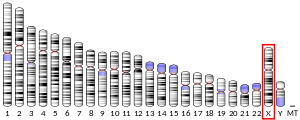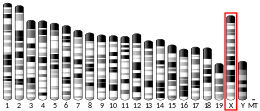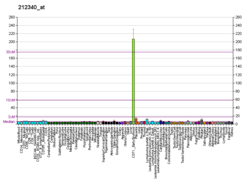Protein YIPF6 is a protein that in humans is encoded by the YIPF6 gene.[5][6]
In mice, a null allele of YIPF6 has been found to cause intestinal inflammation resulting in spontaneous colitis and ileitis by impairing intestinal homeostasis. The impairment was due to defects in the formation and secretion of large secretory granules from goblet and Paneth cells.[7] Because the X-linked YIPF6 mutation resulted in spontaneous disease, it has been suggested that it may increase susceptibility to inflammatory bowel disease in humans, particularly in males.[7][8]
References
- 1 2 3 GRCh38: Ensembl release 89: ENSG00000181704 - Ensembl, May 2017
- 1 2 3 GRCm38: Ensembl release 89: ENSMUSG00000047694 - Ensembl, May 2017
- ↑ "Human PubMed Reference:".
- ↑ "Mouse PubMed Reference:".
- ↑ Strausberg RL, Feingold EA, Grouse LH, et al. (Dec 2002). "Generation and initial analysis of more than 15,000 full-length human and mouse cDNA sequences". Proc Natl Acad Sci U S A. 99 (26): 16899–16903. doi:10.1073/pnas.242603899. PMC 139241. PMID 12477932.
- ↑ "Entrez Gene: YIPF6 Yip1 domain family, member 6".
- 1 2 Brandl, Katherina; Tomisato, Wataru; Li, Xiaohong; et al. (July 2012). "Yip1 domain family, member 6 (Yipf6) mutation induces spontaneous intestinal inflammation in mice". Proceedings of the National Academy of Sciences. 109 (31): 12650–12655. doi:10.1073/pnas.1210366109. PMC 3412000. PMID 22802641.
- ↑ Moresco, Eva Marie Y.; Brandl, Katherina (January 2013). "Linking membrane trafficking and intestinal homeostasis". Tissue Barriers. 1 (1): e23119. doi:10.4161/tisb.23119. PMC 3875636. PMID 24665373.
Further reading
- Hartley JL, Temple GF, Brasch MA (2001). "DNA cloning using in vitro site-specific recombination". Genome Res. 10 (11): 1788–1795. doi:10.1101/gr.143000. PMC 310948. PMID 11076863.
- Simpson JC, Wellenreuther R, Poustka A, et al. (2001). "Systematic subcellular localization of novel proteins identified by large-scale cDNA sequencing". EMBO Rep. 1 (3): 287–292. doi:10.1093/embo-reports/kvd058. PMC 1083732. PMID 11256614.
- Ota T, Suzuki Y, Nishikawa T, et al. (2004). "Complete sequencing and characterization of 21,243 full-length human cDNAs". Nat. Genet. 36 (1): 40–45. doi:10.1038/ng1285. PMID 14702039.
- Gerhard DS, Wagner L, Feingold EA, et al. (2004). "The status, quality, and expansion of the NIH full-length cDNA project: the Mammalian Gene Collection (MGC)". Genome Res. 14 (10B): 2121–2127. doi:10.1101/gr.2596504. PMC 528928. PMID 15489334.
- Wiemann S, Arlt D, Huber W, et al. (2004). "From ORFeome to biology: a functional genomics pipeline". Genome Res. 14 (10B): 2136–2144. doi:10.1101/gr.2576704. PMC 528930. PMID 15489336.
- Ross MT, Grafham DV, Coffey AJ, et al. (2005). "The DNA sequence of the human X chromosome". Nature. 434 (7031): 325–337. doi:10.1038/nature03440. PMC 2665286. PMID 15772651.
- Rual JF, Venkatesan K, Hao T, et al. (2005). "Towards a proteome-scale map of the human protein-protein interaction network". Nature. 437 (7062): 1173–1178. doi:10.1038/nature04209. PMID 16189514.
- Mehrle A, Rosenfelder H, Schupp I, et al. (2006). "The LIFEdb database in 2006". Nucleic Acids Res. 34 (Database issue): D415–D418. doi:10.1093/nar/gkj139. PMC 1347501. PMID 16381901.






